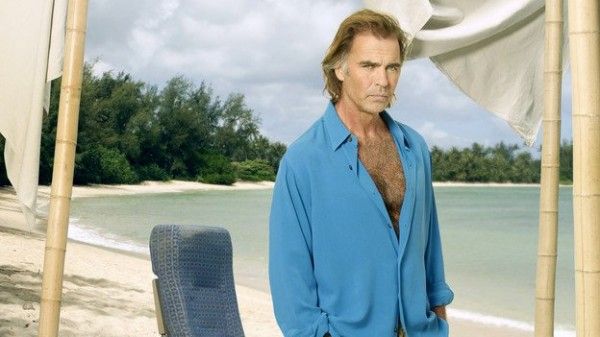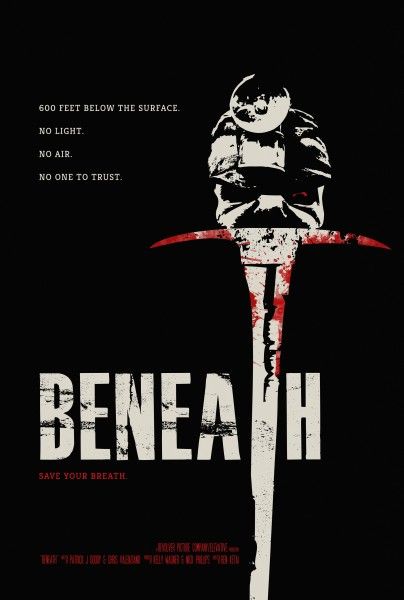Available now on VOD and arriving in select theaters this week is Beneath, a claustrophobic thriller centered on a group of coal miners as they struggle for survival following a catastrophic cave-in. Things go from really bad to even worse when the survivors start hearing mysterious noises and suffering horrifying visions. With bodies piling up and the cave’s air supply growing more toxic by the minute they must figure out who or what is after them. Beneath stars Jeff Fahey, Joey Kern, Kelly Noonan, Brent Briscoe and Eric Etebari.
I recently had the opportunity to jump on the phone for an exclusive interview with Jeff Fahey. He talked about what attracted him to the project, shooting on a dirty, cramped sound stage, and the challenge of playing a character with a physical ailment. He also talked about the joy of being a character actor, bouncing between film and stage productions, and if he prefers one format over the other. Check out what he had to say after the jump.
Tell me a bit about how you cam on board Beneath and what it was about the script that grabbed you.
JEFF FAHEY: Well I've done a number of genre films in this arena, but what really immediately attracted me was the character study of these individuals in psychological horror, if you will. I didn't have an interest in doing a film, at this time, that was gory and this had this wonderful claustrophobic horror about it. It was just the idea of wondering if it was real or not. Even in the read, as I was reading the screenplay. So yeah, the characters. And also, meeting with Ben Ketai, the director/writer. I'm old friends with Nick [Phillips] and Kelly [Wagner], the producers, and I wanted to be part of their new young company.
You mention the characters and that's really a stand out of the film for me, because a lot of genre movies don't allow for the kind of character development you see in Beneath.
FAHEY: Exactly.
Did you work with the other actors beforehand to create these relationship, or was everything you needed already there on the page?
FAHEY: Well it was certainly on the page and then of course, as every project is, it's the relationship between the actors as they're working. Hopefully that's as solid as it is on the page and in this situation it turned out to be. We all got along wonderfully. The film itself, even the set was very claustrophobic, so we were all in together for long days and a quick shoot. It was on the page, but it was also in the relationship between all the actors and working together. And of course with the guidance and vision of Ben, the director.
Did you guys have any opportunity to rehearse? I know a lot of times on these low budget films there's just not time for it.
FAHEY: We had about a week before, people would come in, we had a specialist who was actually a miner who talked to us. I think we had a couple days to rehearse and get to know each other. The key for me is the relationship between the actors and then their relationship with the script. Because if everyone's comfortable, you can pretty much make any kind of movie that the director wants and that was pretty much the situation with this.
I was impressed to learn that this was shot on a soundstage, I never would have guessed. Talk a little bit about what the shoot was like for you, because you guys were covered in dirt and crammed in these tiny spaces.
FAHEY: Oh, it was dirty. We could have easily been in the mines [laughs], of course we could walk to our dressing room off the set, but everyone was covered in soot and dirt and dust for the duration for the shoot. I think it was about three and half, four weeks. So we had thirteen to fourteen hour days covered in mud, but then again, it's just a movie so we all knew we could get out of the cave, take a shower, have a meal, and get back to the real world.
Was the claustrophobic element of the shoot and the set an issue for you at all or were you able to deal with it fine?
FAHEY: Oh, no. It was fine. As claustrophobic as it looks in the film, you're only two minutes away from getting out of any situation. Not at all. I can't speak for anybody else, but for me it was fine.
Your character has an obvious and serious physical ailment from his years in the mines. How much of challenge was that for you as an actor?
FAHEY: Yeah, for twelve hours a day and three and a half weeks, it was a lot. But I did talk to Ben and what we did was sometimes during the filming - the coughing, I would sort of do it half way knowing that in post-production and ADR we could lay on a lot of it. So they had me coughing just to match the movement. It was kind of half and half, because after a while you can't do that. Thank god for technology and we were able to then lay that in afterward.
Yeah, I can imagine that would get exhausting. These mining collapses are obviously a real world issue and they happen a lot, outside of talking to the miner that visited you on set, did you do any research into reports from real life cave ins or things like that?
FAHEY: No. Everything was on the page, and again, Ben's vision. He kind of guided us though it. Myself, I didn’t have to do too much research, nor did I have the time because it all happened pretty quickly. If you talk with the other actors they may have done more, but no, I just spoke with him for a bit then wardrobe showed up and delivered the jazz.
You're one of those awesome character actors that's always working, I looked on IMDB and you had ten credits in one recent year.
FAHEY: I've been in London for the last ten months. I just finished last week doing "12 Angry Men". The performance finished last week and I flew from there to Durango, Mexico and the next day I was on a horse [laughs]. I'm down here doing the eight-hour miniseries Texas Rising for the History Channel with the same group that did Hatfields & McCoys.
That must be a tremendously unique life you live to go into so many different projects on such a regular basis.
FAHEY: Oh, it's been such a gift. I've been very fortunate. So many people have to struggle and I just feel very lucky and grateful that I have worked all these years, and worked with some wonderful people. And having these great, wonderful surprises every once and while, these little gems I call them, which is what Beneath is. Because with Nick and Kelly the producers, their credits and their time in the industry are wonderful, and they have this new young company - that’s also one of the number of reasons to be part of this. I was very grateful that they called me. Which I always am, anyone should be. In answer to your question, I feel very lucky and fortunate.
I know a lot of character actors will have people come up to them in the streets like, "You look so familiar." Is that something you get often?
FAHEY: [Laughs] Oh you get that now and again, people recognize you from different things, but that's another thing, I've been very fortunate not to be bothered. People don't bother me very much, and if they do it's not a bother. From different programs, whether it's Lost or Lawnmower Man from years ago. I'm working with a lot of the actors here, we were on the set the other day doing a scene and somebody said something in reference toSilverado, and the actor on the horse next to me turned and said, "That's right, you were in that! I saw that movie when I was five years old." And he started reciting all the lines. It happens in so many wonderful ways.
As you've just come off a theater production straight to a film, do you find a tremendous difference between performing for theater and film? Is one more satisfying than the other for you?
FAHEY: I find them equally, as I'm sure others do - they're completely different animals, but equally as wonderful. It's tough to match that thrill of doing a wonderful play to a full theater eight times a week, but by the same token working with Roland Joffe, who's one of the great directors. So to have a conversation, to have the subtleties of the filming process, working with the camera and the other actors, and trying it multiple ways. To me that's a whole other animal that has its great rewards also. I like them equally as much and enjoy them totally when I'm in them.
Is it ever strange for you to go into the extensive rehearsal process of theater when you come off a film?
FAHEY: I mean you've got a play, you've got four weeks to rehearse. I don't know how expensive it is. It's expensive for the producers to put the show up.
Oh no, extensive not expensive.
FAHEY: That is a gift to have four weeks to rehearse something. But remember, when you’re doing a play half of that time you're getting to know the play and the other actors and then finally in the third week you have it pretty much on its feet. So it's all relative in different ways. But yeah, the rehearsal process is - it would be wonderful. Sidney Lumet used to do that in film, he would rehearse his actors for two weeks, but most of the time you don't get the rehearsing, you just have to show up and deliver.



